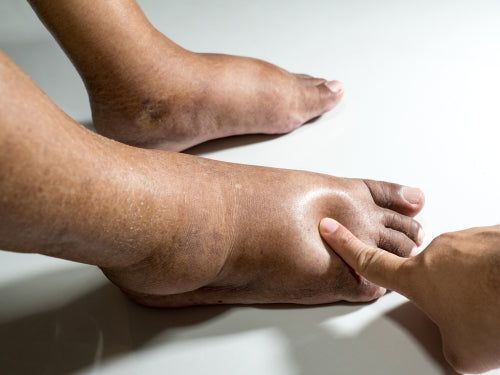Introduction
Edema is swelling caused by excess fluid trapped in your body’s tissues. It can affect any part of the body, but it’s most common in the hands, arms, feet, ankles and legs.

Edema is often a symptom of an underlying medical condition, such as heart failure, kidney disease or cirrhosis of the liver. It can also be caused by medications, pregnancy or prolonged standing or sitting.
Symptoms of Edema
The most common symptom of edema is swelling in the affected area. Other symptoms may include:
- Swelling or puffiness of the tissue directly under your skin
- Stretched or shiny skin
- Skin that retains a dimple (pits) after being pressed for several seconds
- Increased abdominal size
If you have any of these symptoms, it’s important to see your doctor to determine the underlying cause.
Causes of Edema
There are many potential causes of edema, including:
- Congestive heart failure: The heart is unable to pump blood effectively, which causes fluid to build up in the body.
- Kidney disease: The kidneys are not able to remove waste products and fluids from the body effectively.
- Cirrhosis of the liver: The liver is unable to produce enough albumin, a protein that helps keep fluid in the bloodstream.
- Medications: Certain medications can cause edema, including some blood pressure medications, steroids and non-steroidal anti-inflammatory drugs (NSAIDs).
- Pregnancy: Fluid retention is common during pregnancy.
- Prolonged standing or sitting: Gravity can cause fluid to pool in the lower legs and feet.
- Lymphedema: This is a type of edema that occurs when the lymphatic system is damaged or blocked.
Treatment for Edema
Treatment for edema depends on the underlying cause. If the cause is a medical condition, treating the condition will often resolve the edema.
In some cases, your doctor may recommend:
- Medications: Diuretics can help to remove excess fluid from the body.
- Compression stockings: Compression stockings help to prevent fluid from pooling in the lower legs and feet.
- Elevation: Elevating the affected area can help to reduce swelling.
- Lifestyle changes: Losing weight, eating a healthy diet and getting regular exercise can help to prevent edema.
When to See a Doctor
If you are experiencing edema, it is important to see a doctor to determine the underlying cause and receive appropriate treatment.
Edema can be a sign of a serious medical condition, so it is important to seek medical attention if you are experiencing any of the following symptoms:
- Sudden onset of edema
- Edema that is accompanied by pain, redness or warmth
- Edema that is affecting your breathing
- Edema that does not improve with home treatment
This blog post is for informational purposes only and should not be construed as medical advice. Always consult with a qualified healthcare professional for diagnosis and treatment.

.jpg)